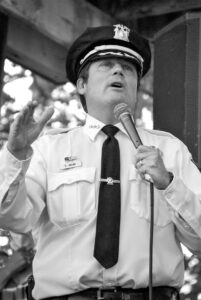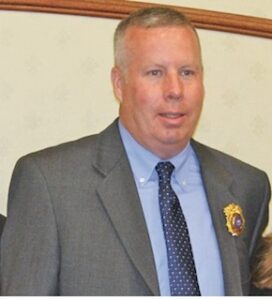Communities across the nation have recently seen the streets erupt in protest against racial injustice, and the mostly tranquil towns along the Hudson have been no exceptions.
Since the death of George Floyd at the hands of Minneapolis police on Memorial Day 2020 triggered a tidal wave of civil disobedience, much of the protestors’ ire has been directed toward members of law enforcement.
Peekskill and Tarrytown have seen some of the largest recent protests in our area, and their respective police chiefs spoke with us to give their perspectives on the outcry for police reform, as well as measures they’ve taken toward improving relations with residents.
Tarrytown Chief John Barbelet responded to questions during a phone interview, while Chief Donald Halmy of Peekskill replied via email to the same questions.
COOPERATIVE EFFORT

“We have always worked hard to maintain a good relationship with the community, and that has continued through this process,” said Chief Halmy.
As far as ensuring his department is prepared for possible violence arising during the protests, Halmy said that other local police departments are readily available to help, a cooperative effort expedited by Covid-19 response, which established the routine of online conferencing between departments.
“Before every protest,” said Chief Halmy, “officers are briefed on the logistics of the event, and always reminded to act in a neutral and professional manner with the main focus on the safety of everyone.
Similarly, Chief Barbelet discussed the extensive training his officers already had for deescalating volatile – or violent — situations, as well as refreshers and new training.

AVERTING CONFLICT
The preparation came into play at the end of June, when a Black Lives Matter protest clashed with a competing Back the Blue rally, supporting police in Tarrytown. While tense arguments occurred between the conflicting sides, the events remained conflict-free.
Still, Barbelet hopes protestors stay mindful that there’s only so much his officers can do in a given scenario. “What happens at a protest for it to remain peaceful is a two-way street,” he said.
“The police have to maintain their professionalism, and have some thick skin sometimes, and the protestors have to realize that we’re out there to maintain the safety for the public—not just for them, but for everyone in the area.”
OPEN DIALOGUE
As the emotional intensity behind Black Lives Matter has mushroomed into a historic, multi-racial movement, both Barbelet and Halmy recognize the importance of keeping an open dialogue.
“One of the keys to ensuring a safe and peaceful event is to have good communication with the organizers of the event,” said Halmy. “Most negative influencers tend to come from outside the jurisdiction and usually the organizers do not condone these behaviors. Being on the same page helps to negate some of these fears.”
PROTEST RIGHTS
Barbelet also said he and his officers try to maintain communication with protest organizers, “because we respect their rights to protest.”
With the protests adding to the pressure–cooker environment of the combatively partisan political climate and families and friends physically separated and struggling financially due to the pandemic, Halmy stressed the importance of remaining optimistic about the fight for equality.
He said, “The main approach is to focus on the positive nature of social change,” he said. “Most people will approve of changes that focus on things like equality and the end to any discrimination. While most of us can be initially resistant to change, as long as the positives can be realized, then it’s easier to promote. If the approach comes off as being anti-police, then morale can suffer.”
Barbelet concurred with that sentiment, and also sees room for improvement through police reform.
WORDS TO THE WISE
“With all these reforms, we need to do it together,” he said. “If you continue to vilify law enforcement in general, you’re going to lose very good police officers—ones who are progressive, ones who are out there to serve the community in the proper fashion; you’re going to lose those.
“Then you’re also not going to get good, qualified candidates to want to take the job. And when I say ‘good, qualified candidates,’ I’m also talking about some of these teenagers who are out there protesting. I would welcome them to take the police test and come in here and bring their ideals and their trains of thought.”
At the end of the day, Chief Barbelet wants everyone to know the role of the local police: “Our job is to support freedom of speech, our job is to keep everyone safe.”
Jon Jackson is a writer and editor who hails from Brooklyn.




